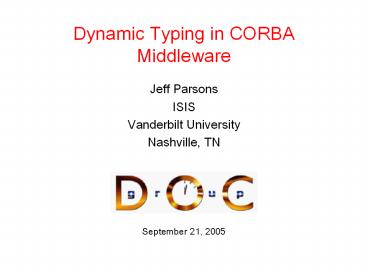Dynamic Typing in CORBA Middleware - PowerPoint PPT Presentation
Title:
Dynamic Typing in CORBA Middleware
Description:
Dynamic Typing in CORBA Middleware Jeff Parsons ISIS Vanderbilt University Nashville, TN Static vs. Dynamic Typing Static typing Type rules in compiler. – PowerPoint PPT presentation
Number of Views:119
Avg rating:3.0/5.0
Title: Dynamic Typing in CORBA Middleware
1
Dynamic Typing in CORBA Middleware
- Jeff Parsons
- ISIS
- Vanderbilt University
- Nashville, TN
2
Static vs. Dynamic Typing
- Static typing
- Type rules in compiler.
- New types at development time.
- No new types at run time.
- Dynamic typing
- Type rules also implicit in source code.
- Enables new types at run time.
- Dynamic CORBA contains type rules for IDL, not
target language.
3
Static Typing
- All operation names and signatures known at
compile time. - Advantages
- Efficient marshaling.
- Streamlined invocation.
- Disadvantages
- Larger generated code footprint.
- Inflexible.
- Unacceptable in open-ended systems.
4
Dynamic Typing
- Discovery of operation names and parameter types
at runtime. - Advantages
- Smaller generated code footprint.
- Flexible open-ended.
- Disadvantages
- Larger ORB footprint.
- Slower marshaling.
- Pre- and post-invocation overhead.
5
Dynamic CORBA Features
6
Type Code
- union foo switch (char)
- case a long num
- case b string str
- struct bar
- stringlt12gt str_mem
- foo u_mem
- boolean b_mem
- Structural representation
- Basic TCs in ORB
- New TCs from IDL compiler or type code factory
7
Any, NamedValue, NVList
- Any
- Represents generic IDL value
- Type code describes value
- Value is opaque
- Overloaded insertion extraction operators
- Basic types in ORB
- New types from IDL compiler
- NamedValue
- Represents operation argument
- Any name direction
- NVList
- Represents operation signature
- List of NamedValues
8
Dynamic Invocation Interface (DII)
- Used when IDL compiler generated code is not
available. - A request object is created by a local call on
the target object reference. - Dynamic Skeleton Interface (DSI) is the
server-side counterpart to DII.
9
Type Code Factory
- Problem Creating a TypeCode at run-time.
- Forces
- Family of related TypeCodes.
- Optional use by application.
- Necessary to Interface Repository.
- Avoid penalty to static application.
- Solution Abstract Factory pattern and separate
library.
10
The Interface Repository (IFR)
- Problem Providing run-time IDL type information.
- Forces
- Need persistent storage.
- Need OO database - query results are CORBA
objects. - Must preserve nested (scoped) structure.
- Solution
- View entries as meta-objects.
- Use the Memento pattern to capture their state.
- Use tree of hash tables for underlying storage.
- Create query results on demand.
11
Managing the Interface Repository
- Problem Providing a systematic way to manage the
repositorys contents. - Forces
- Load from IDL files.
- Reuse IDL compilers parsing and error checking.
- IDL compiler is built monolithically.
- Solution Modularize the IDL compiler.
- Reusable front end.
- Pluggable back end.
- Top-level executable.
12
Dynamic CORBA - Putting It All Together
13
Evaluation of Dynamic CORBA Features
- Interdependency
- Explicit
- Implicit
- Hybrid Applications
- Need not use dynamic typing throughout.
- May use subset of features.
- Generality vs. Overhead
- Tradeoff
- Portability
- Widespread ORB vendor support.































